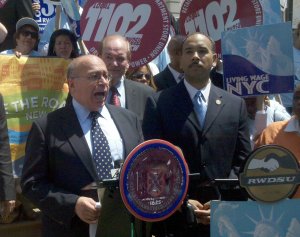 A “living wage” bill is being introduced in the City Council today, led by a set of Bronx elected officials, and the legislation itself is now up on the Council’s Web site.
A “living wage” bill is being introduced in the City Council today, led by a set of Bronx elected officials, and the legislation itself is now up on the Council’s Web site.
The bill, dubbed the Fair Wages for New Yorkers Act, would force most every development receiving city subsidies of at least $100,000 to require a minimum wage of $11.50 an hour (or $10 and benefits) for anyone working in the development, a mandate that would mostly affect retail jobs (which tend to be low wage).
The Bronx elected officials—led by Bronx Borough President Ruben Diaz Jr.—and the Retail Wholesale and Department Store Union are launching a campaign on the issue (with T-shirts, a logo, a Web site and all), and held a press conference Tuesday at City Hall (one which Mayor Bloomberg walked by with a smirk on his face) to press the issue.
Indeed, the text of the bill certainly displays more effort and some sense of reality than a similar bill introduced by some of the same elected officials last session. That bill called for all developments receiving at least $10,000 of subsidy to mandate the living wage, something that would anger far more subsidy recipients. The new bill also exempts developments used exclusively for affordable housing, and developments that house a cultural institution or social services organization.
Here’s a piece of the bill, complete with charged rhetoric:
“It is the policy of the city that jobs supported with financial assistance, whether conferred directly by the city or indirectly by a city economic development entity, should pay wages that allow working New Yorkers to support themselves with dignity. In furtherance of this policy, covered employers shall pay their employees no less than a living wage.”
The wage would also be tied to the CPI, adjusting for inflation (a rational way of doing policy that is often left out of legislation on issues such as, say, legislator pay).
Resistance on the issue comes from the mayor, who says it will slow development, and the real estate industry, which, too, worries it would slow development given the higher costs (and lower rents one could charge) that would come as a result.


